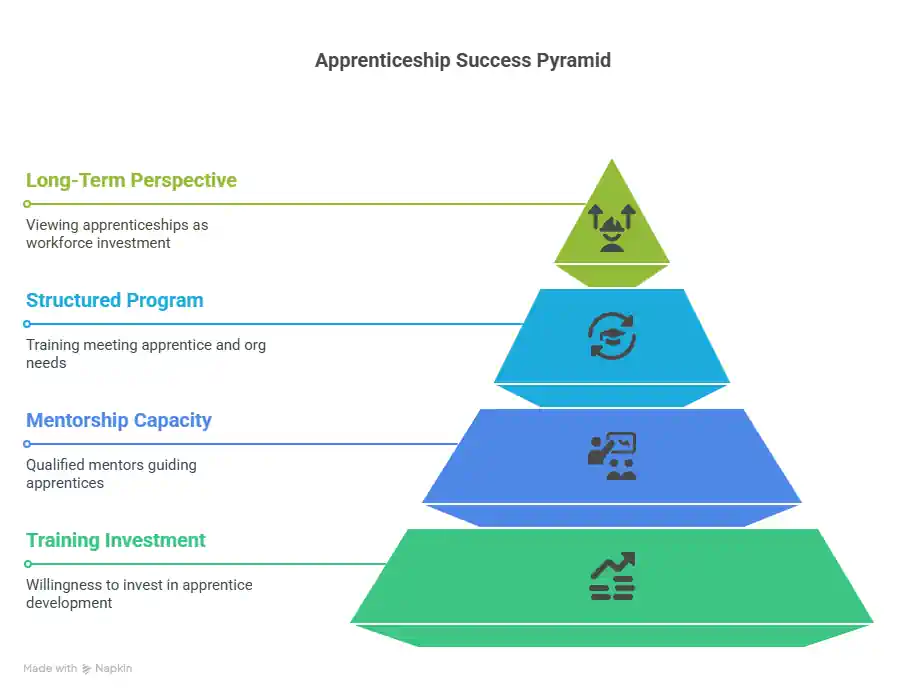Press Release:
UK Government Apprenticeship Changes Welcomed by Leading Pump Business
Landia, the leading pump and mixing manufacturer, has welcomed government moves to invest in tens of thousands of new apprenticeship on the-job training opportunities. It's a real boost to apprenticeship on the-job training.
At a time when around one million 16-to-24-year-olds are neither working nor in full-time education or training, Landia believes that its consistent success in developing highly tailored opportunities creates huge benefits for a business and for those young people keen to carve out a career.
Speaking for Landia, Tamas Rieder (Service and Aftersales Manager), who steers Landia apprentices through their journey from beginning to end, commented:
“To reap the rewards of seeing homegrown apprentices mature into skilled employees, companies must now take full responsibility and realise that their workforce is only going to be as good as they train them to be.
“Arm your apprentices with the proper tools to do the job, encourage them, give them time and proper hands-on experience.

Tamas Rieder (left) from Landia (Service & Aftersales Manager) with Landia apprentice Will Lewi during apprenticeship on the-job training.
“There’s no doubt that apprenticeship on-the-job training is a long process, but it is very rewarding and totally worth all the effort. It is a big win-win; young new engineers who already have first-class skills and the right attitude towards serving our customers.
In addition to our five fully qualified apprentices (three of whom have been with Landia for over a decade), our current apprentice, Will Lewis, is soon to complete his first 12 months with us.”
He continued:
“Gone are the days when smaller firms would just cash in for free on a flood of new apprentices that came out of the big businesses hungry for work. Those big industry names simply aren't there anymore.
“Anything the government can do, as they say, ‘to back the next generation by giving young people more opportunities to learn a trade, earn a wage and achieve and thrive’ should be welcomed.
“Successive governments decided that it was far cheaper to import skills than help train our own children, so no wonder we have so many unskilled, unmotivated young people in the UK because nobody has trained them. It is high time to put this right.”

What's Behind This?
UK Government's Apprentice Training Announcement 2025: Key Changes
The UK government recently announced significant changes to spending on apprentice training.
The goal is to create 120,000 new training opportunities and redirect funding towards foundational and entry-level apprenticeships, especially for young people.
Key Aspects of the 2025 UK Apprentice Training Announcement
- Record-breaking Apprenticeship Budget: The government has committed a “record-breaking” £3 billion apprenticeship budget for the current financial year (2025-2026).
- Focus on Young People and Entry-Level:
- A primary objective is to open up more opportunities for young people (aged 16-21) to succeed in careers vital for the country's economy, including an additional 30,000 apprenticeship on the-job training apprenticeship starts across this Parliament.
- Defunding of Level 7 (Master ‘s-level) Apprenticeships: From January 2026, public funding for Level 7 apprenticeships will be removed for individuals aged 22 and older. This aims to rebalance levy funding towards training at lower levels. Support will continue for those aged 16-21 and existing Level 7 apprentices.
- Introduction of Foundation Apprenticeships: New Foundation Apprenticeships are being introduced, starting in August (presumably 2025). These are primarily for 16-21 year olds and target entry-level roles in sectors like construction, engineering, manufacturing, health, and social care. Employer incentives of up to £2,000 are available for eligible foundation apprenticeships.
- Increased Immigration Skills Charge: The Immigration Skills Charge (ISC), a fee paid by employers sponsoring migrant workers, will see a 32% increase. This is intended to fund up to 45,000 additional training places for the domestic workforce, aiming to reduce reliance on migration in priority sectors.
- Skills Bootcamps and Technical Colleges:
- £136 million is allocated for Skills Bootcamps across a range of priority sectors in 2025-2026, providing training to over 40,000 learners.
- An additional £100 million over four years will expand Construction Skills Bootcamps.
- Ten technical excellence colleges specialising in construction skills are set to open in September 2025.
- £14 million of adult skills funding for construction will be devolved to local mayors to support up to 5,000 new adult learners.
- Increased Flexibility in Apprenticeship Delivery:
- The minimum duration for apprenticeship on-the-job training will be reduced from 12 months to 8 months, where appropriate, allowing for quicker occupational competence.
- Off-the-job training requirements will now be set as a minimum volume of hours for each standard, replacing the previous 20% rule and offering more flexibility.
- Assessment processes are being streamlined, with the possibility of assessments taking place at any stage of the apprenticeship rather than being restricted to the end.

The government's rationale behind these changes includes addressing high youth unemployment and inactivity, rebalancing the apprenticeship system to encourage investment in youth apprenticeships, and generally upskilling the domestic workforce to drive economic growth.
While many welcome the focus on young people and entry-level opportunities, some critics have raised concerns about:
- the defunding of Level 7 apprenticeships,
- particularly for their potential impact on vital sectors like healthcare and engineering that rely on higher-level skills development.




